Social Media Savvy And Safety!
Like it or not, our society is heavily impacted by social media. While those of my generation may long to see our younger counterparts build the mainstay of their relationships from friendships formed at work, school or church…like we did back in the day…there’s a lot to be said for the positive aspects of the ever mounting popularity of cyberspace–as long as we continually educate ourselves on using it wisely, that is, and protecting ourselves against the negative effects it can have on our lives–no matter our age!
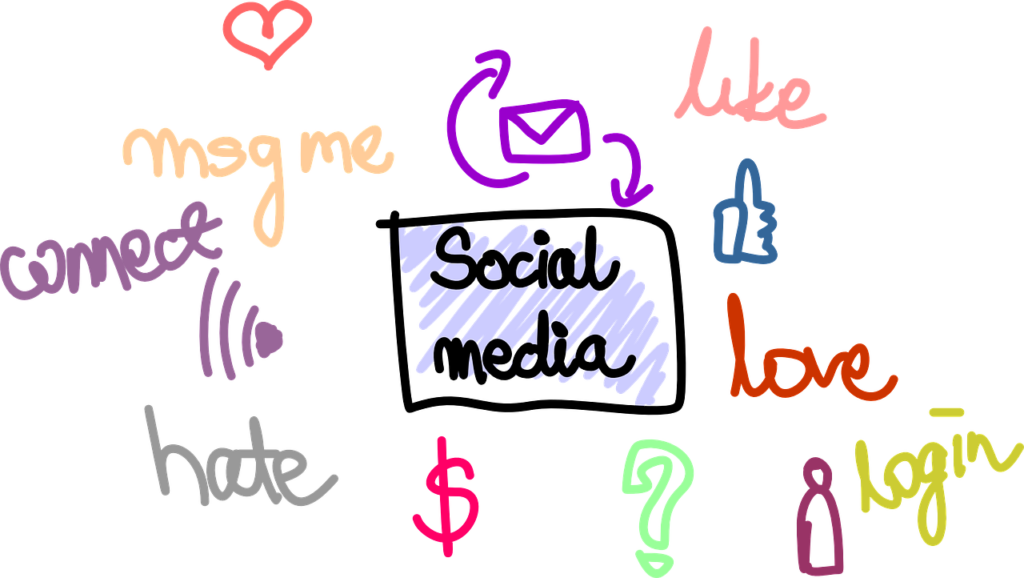
“Technology is a useful servant, but a dangerous master!” Christian Lange
I don’t think it is news to anyone that the world wide web is a place where a lot of information, chances for social interaction, and entertainment are easily found. Technology has also revolutionized the workplace–where often showing up for work simply means grabbing your laptop off your bedside table and working from the comforts of your home. Virtual entertainment has quickly become the “go-to” for anyone wanting to play games or watch videos. Online instructions have also become a fairly reputable resource for a wide range of lessons from simple household DIY’s to classes in cross-fit training. But all this aside…it still takes a certain amount of savvy to navigate the internet safely and balance it properly in our lives so we don’t let it waste valuable time. Certainly, nothing should ever replace the meaningful impact of reaching out personally to sustain valuable relationships with those who make life so fulfilling and worthwhile!

Bridging The Computer Literacy Gap!
While it may be true that tech developers tend to mostly target the younger population with their campaign ads, current research from the American Association of Retired Persons (AARP) is quick to point out that the older generation isn’t as apathetic or fearful of current computer trends as once believed. In fact, they report that since 2009 there has been a steady rise in the number of people 65 years of age and older who regularly use email and Skype to communicate with family members, and nearly 70% now use social media sites like LinkedIn and Facebook to stay informed about job news and health information. Many seniors are finding that they feel less isolated by being able to connect with the outside world via the internet. Computer games have also been found to be very beneficial in improving the memories and sequencing abilities of elderly people. I guess if you can’t beat ’em–you might as well join ’em…right?!

Insights From An Expert!
For further, more in-depth insight on this subject, I’ve turned to someone I consider an expert in the field of computers…in fact, my friend, Leslie, actually holds the title of School Technology Specialist in our local school district–not only is she a computer wizard extraordinaire, she currently oversees the internet use and safety of over 100 staff members and 1,500 students…so obviously she is very qualified to address this topic. Leslie is quick to point out that despite your age and level of computer competency, there are certain internet rules and behaviors that apply across the board.
While Leslie admits that it may seem a bit intimidating to keep pace with the ever accelerating pace of all the innovative technology tools available to us, she maintains that social media is a force to be reckoned with and has become an integral part of our daily habits and the preferred means to communicate and share our lives with others. “Used correctly, social media can be a great resource to uplift, inspire and improve someone’s day .”
The Far Reaching Effect Of Social Media!
In discussing the topic of social media, Leslie reminded me of the far reaching effect and positive influence that an online presence can afford each of us.
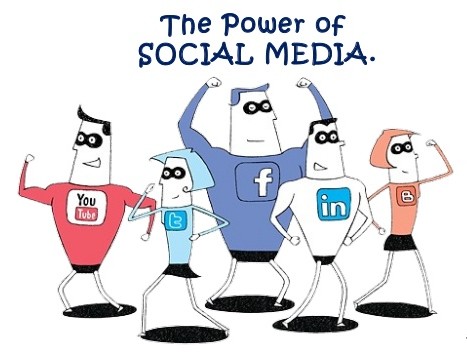
♦ Social media helps us engage with one another. Sharing highlights of our lives can enhance and deepen our relationships with those who live far away. Besides Facebook and Instagram, the more popular online forums for keeping in touch with family and friends, people also have the ability to set up a variety of private social media groups on every possible topic imaginable; ie. virtual book clubs, current event discussion groups, neighborhood and school information boards, to name a few.
♦ Our internet participation has the power to educate and empower! When using social media we might want to ask ourselves these questions: “How can we use time spent on our devices to become more productive citizens? How can we use social media to improve ourselves and our communities? In contemplating these questions, we can’t help but come to realize that social media helps us better understand that we are global citizens, and we can learn to work together to solve world problems.
♦ Our online interactions give us a chance to encourage and uplift! Social media tools give us the chance to stand for truth and goodness. We can voice approval for causes and movements that uplift and edify. Setting a positive example via the internet can help move the dialogue more towards decency and civility–which is so crucial in this day and age of seemingly endless negative online sparring.
♦ Social media has the power to amplify our voice on issues that affect our lives. If we’re looking to expand and encourage the positive impact of online interactions, we need to understand that the accounts that rise to the top and get the most exposure are the ones that get the most likes and shares. We can help encourage goodness by supporting people who are using their social media outlets to encourage and inspire.
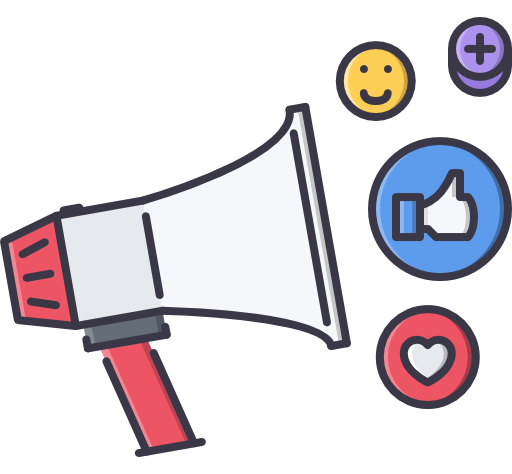
“Example, good or bad, has a powerful influence.” George Washington
Social Media–A Cautionary Tale!
Leslie also admonishes that an important responsibility for each of us, as far as our online usage is concerned, is to continually educate ourselves and keep updated on the social, ethical and legal ramifications at stake as they relate to the ever evolving digital culture.
♦ Play it safe! Remember that social media is a public domain, so as we maneuver our way along the internet information superhighway, protecting our personal information on the sites we use has become more important than ever before. Most online platforms give you the option to share a great deal about yourself, however it doesn’t mean you need to fill them out. Consider a general version of the information requested, for example…list only your state of residency rather than both city and state to make it harder for others to figure out exactly where you live. Create strong passwords using a combination of words and numbers, upper and lowercase letters and specific characters that are easy for you to remember. You might even want to keep a log of these passwords in a special journal that is not located by the devices you frequently use. Another important factor to consider is the privacy settings on any social media outlet. Take the time to explore these privacy guidelines and create a custom list of people who are allowed to view specific posts.

“Caution is the parent of safety.” Proverb
Be aware that there are folks out there who are using social media for nefarious reasons, so be vigilant! There are pieces of personal information that you should never, ever post. These include your Social Security number, driver’s license, bank account information and your specific whereabouts. Don’t make it easier for ill-meaning people to take advantage of you.
A few other cautionary safety points to take into consideration for all ages: block inappropriate websites, never talk to strangers, and beware of “free” offers…they can infect your computer with an online virus. The best protection for online safety is having a decent internet security site that blocks unsafe links and checks every download for signs of malware. (The computer specialist my husband employs suggests using a product like, Kaspersky Total Security or Spybot since they allow you the ability to monitor your whole network from your PC and adjust the security settings of each computer individually.)
And finally, always log out from any device when you are finished using it–especially if it’s a public computer. Log out of your private devices from time to time, as well, to ensure that other people can’t access your social profile to change personal settings or information, attack friends, or make slanderous comments to embarrass or harass you. Sadly, this is more common than we’d like to realize in today’s society.
♦ Keep It Real! No doubt about it, we live in a world that tends to tap into our competitive natures, which can lend itself to people wanting to embellish facts about themselves. When I was growing up, my parents often took the opportunity to say, “Remember who you are…and conduct yourself accordingly!” This doesn’t mean that we can’t learn and grow as individuals in real life–and project that online, but conducting ourselves one way in person and another way on the internet just seems disingenuous. Besides, people are smart and eventually they catch on…then like the popular Aesop’s fable about the boy that cried wolf, eventually no one will believe anything you say! This doesn’t mean you have to share all your warts, (however, it can be somewhat cathartic on occasion if done in good taste) but like the old adage goes, honesty is always the best policy! And while we’re at it, let’s be each other’s cyber cheerleaders, sharing the love, so to speak, when others achieve a goal or work hard to jump one of life’s hard hurdles…in my opinion, that is when the online community is at its best!
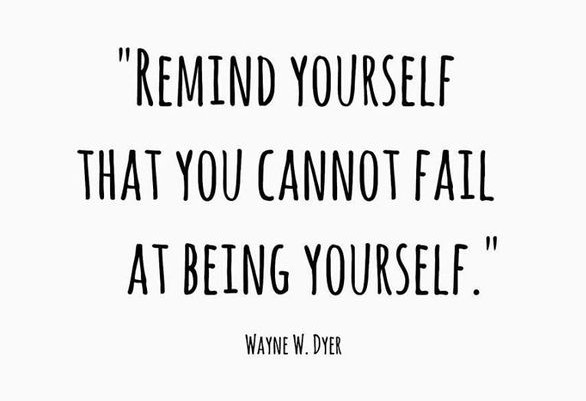 As social media consumers, we also need to be engaged and check sources of information we read online, identifying falsehoods and misinformation. In a recent interview, Apple CEO, Tim Cook, said, “Some social media tools are unwisely used to divide people and manipulate them–to get fake news out to people in broad numbers, wrongly influencing their thinking based on nothing but made-up conjectures.”
As social media consumers, we also need to be engaged and check sources of information we read online, identifying falsehoods and misinformation. In a recent interview, Apple CEO, Tim Cook, said, “Some social media tools are unwisely used to divide people and manipulate them–to get fake news out to people in broad numbers, wrongly influencing their thinking based on nothing but made-up conjectures.”
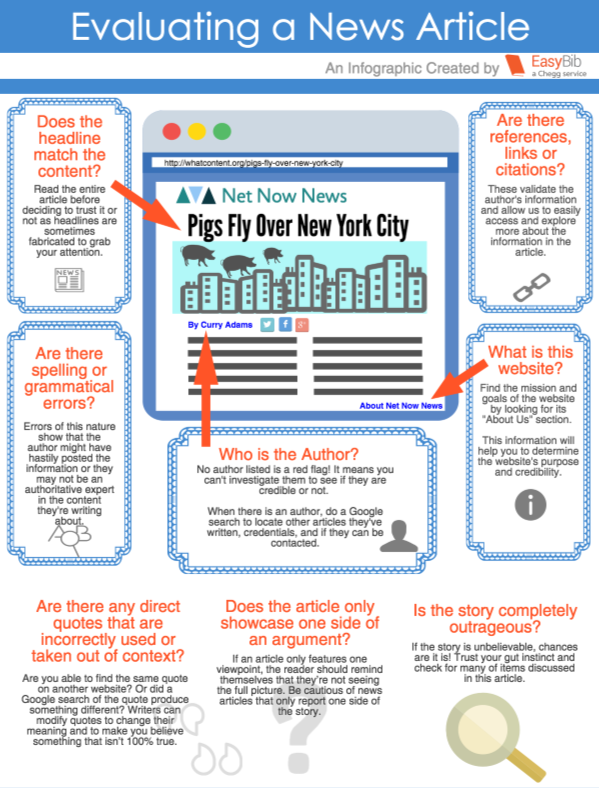
♦ Follow the “Golden Rule” of cyberspace. Good behavior should be taught in our homes, and this applies to computer use too. Decide as a family what rules you want applied to computer and social media use. As adults we should emulate the kind of online behavior we want our children to have. Here is a good rule of thumb for everyone to incorporate in their everyday internet conduct:
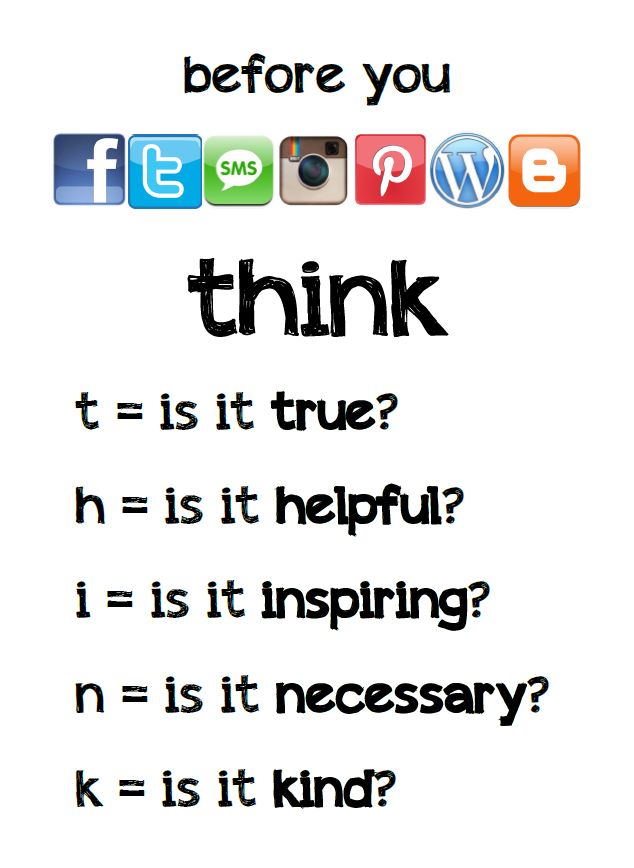 (Check out more do’s and don’t to a positive social media experience here.)
(Check out more do’s and don’t to a positive social media experience here.)
My husband, who is not a social media kind of guy, always cautioned our kids with this advice:
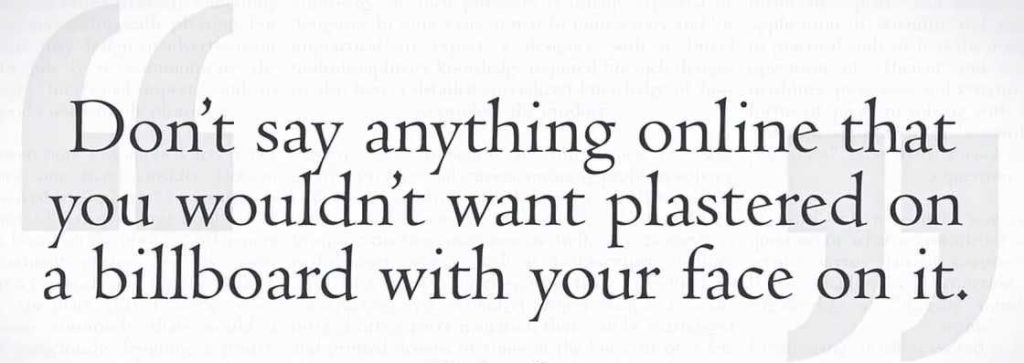 Obviously, there are times and places that are appropriate for being online…we show our level of maturity and consideration by knowing when it’s time to unplug and be “present” in our daily lives! My dad lived by the motto “moderation in all things” and perhaps in these modern times, there’s no area where we should apply this mindset more than in our daily internet habits!
Obviously, there are times and places that are appropriate for being online…we show our level of maturity and consideration by knowing when it’s time to unplug and be “present” in our daily lives! My dad lived by the motto “moderation in all things” and perhaps in these modern times, there’s no area where we should apply this mindset more than in our daily internet habits!
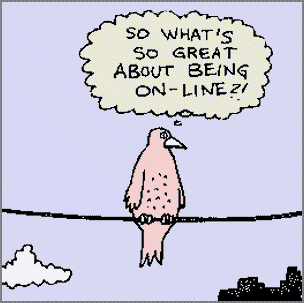
“A computer screen limits your real life experiences! John le Carre
I like the wisdom Leslie shared as she concluded her email to me on the role social media should play in our lives…
“We are more than capable of giving our internet use the proper priority it should take in our lives to avoid the easy distraction it can become from family, relationships and obligations. It is important to keep a realistic perspective about social media. Why let it have the power to have a negative impact on the way we feel about ourselves and the wonderful lives we lead. Yes, we see friends posting pictures of great trips, lovely families, and beautiful lifestyles, and it makes it look like they have amazing lives every minute of every day. We often forget that they are posting their highlight reels!”
Perfectly said, Leslie. Thanks so much for sharing your expertise on this important subject with us!
What are some ways you’ve found that help you strike a good balance with social media use in your lives?
–Love, Mary
